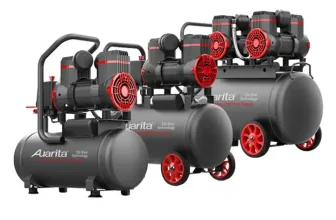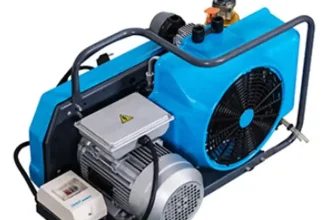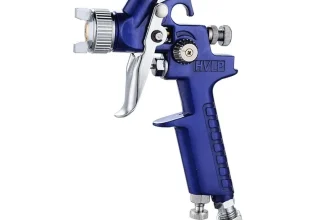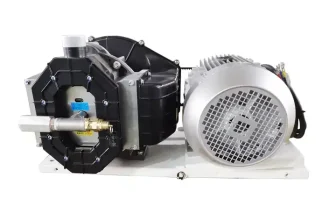Air compressor oil, often referred to as compressor lubricant, is a necessity for the efficient operation of any air compressor. It plays a fundamental role in keeping the compressor cool, ensuring the unit’s moving parts are lubricated adequately, reducing friction, and hence minimizing wear and tear. As a multi-faceted tool, air compressor oil increases the lifespan of your compressor and ensures it runs at optimal levels reducing instances of downtime and maintenance costs. Like any great masterpiece that needs a hidden hero, air compressors require premium quality oil to maintain their performance and longevity.
Importance of Air Compressor Oil
Air compressor oil plays a critical role in ensuring the smooth operation of pneumatic systems. This specialized oil contributes significantly to the longevity of the air compressor, minimizing wear and tear and reducing the frequency of system breakdowns. In addition to its primary function of lubrication, air compressor oil also helps in reducing the heat generated during operation, thereby enhancing the performance and efficiency of the system. Neglecting this essential component can lead to system inefficiency, increased maintenance costs, or total system failure. Therefore, understanding air compressor oil, its uses, and proper maintenance is crucial for anyone invested in pneumatic systems.
Understanding Air Compressor
Definition of Air Compressor
An air compressor is a mechanical device that uses power, typically from an electric motor or a gas engine, to compress air. This compression increases the pressure of the air, storing it in a tank for later use. The pressurized air can then be utilized to power a range of tools, machinery or processes by releasing the stored energy. It can heat or cool a space, adjust the operation of engine intake valves, or operate pneumatic tools like air drills, nail guns and sprayers. Essentially, an air compressor converts power into potential energy, which is stored as pressurized, or compressed, air.
Types of Air Compressors
Air compressors come in various types, each designed to meet specific needs and applications. Below are some of the most common types.
- Positive Displacement Compressors: These compressors work by increasing air pressure and decreasing its volume. They are the most commonly used for industrial operations, and they include:
- Reciprocating Compressors: Also known as piston compressors, they work similarly to car engines, where the piston compresses the air in the cylinder to increase its pressure.
- Rotary Screw Compressors: These use two rotating helical screws to compress the air, making them great for continuous use applications.
- Rotary Vane Compressors: They have a rotor with several blades inserted in the rotor slots, providing consistent, pulse-free air flow.
- Dynamic Displacement Compressors: Also known as turbocompressors, they use speed rather than a physical barrier to compress air. The two main types are:
- Centrifugal Compressors: This uses an impeller to increase the velocity of the air and converts the kinetic energy into potential energy.
- Axial Flow Compressors: Air flows parallel to the axis of rotation in these compressors, and are generally used for large volume and high-speed applications.
- Special Compressors: These include Scroll compressors, Diaphragm compressors, among others, offering unique properties like oilless operation, high-pressure ratio, and more.
Each of these type has varying capabilities, efficiency, and cost, so understanding the specific needs of your operation will help you choose an air compressor that will serve you best.
Uses of Air Compressors
Air compressors exhibit a wide range of utility in various sectors, primarily due to their versatile functionality. In the industrial sector, air compressors play an integral role in powering machinery and tools. They are used in the automation of manufacturing processes and to manage and control machines in production lines.
Air compressors are also crucial in the construction industry where they power tools like jackhammers, staple guns, sanders, and many others, enhancing efficiency and productivity. They provide the energy necessary for the operation of pneumatic tools which are reliable, easier to use, and often more powerful than their electric counterparts.
The automotive industry is another notable user of air compressors as they are employed in tasks such as inflating tires, spray painting of vehicles, and even powering air brake systems in commercial trucks and buses.
Air compressors also find use in the HVAC (heating, ventilation and air conditioning) industry. They play an essential role in refrigeration and air conditioning systems, where they move and compress refrigerant gas to facilitate cooling.
In addition, air compressors serve critical functions in healthcare, mining and diving industries. From powering drills for underground excavation in mining, providing clean pressurized air supply to divers, to driving surgical and dental tools in hospitals, the usability of air compressors cannot be overstated.
On a smaller scale yet significantly, they are utilized in personal and recreational activities, like inflating bicycle tires, powering paintball guns, and in DIY crafts and projects. Thus, the diverse uses of air compressors prove their significance in both industrial and residential settings.
Basics of Air Compressor Oil
Definition and Composition of Air Compressor Oil
Air compressor oil is a type of lubricant used in air compressors to keep the moving components running smoothly. Its formulation is distinct from regular motor oil, as it needs to endure the high-pressure environment of an air compressor. The composition of this type of oil tends to be a mixture of base oils and additives. The base oils can be either mineral or synthetic, each having particular traits that might be beneficial under specific operational conditions.
Additives, on the other hand, are incorporated to enhance the base oil’s performance. They provide the oil with certain desirable characteristics like corrosion resistance, anti-foam properties, and the ability to withstand high temperatures. Overall, the unique composition of air compressor oil aims to facilitate seamless compressor functioning and serve as a sealant to prevent air leaks, thereby prolonging the lifespan of the air compressor.
Function and Role of Air Compressor Oil
Air compressor oil performs several crucial roles that extend the life and enhance the performance of air compressors. Its primary function is to lubricate. By serving as a lubricant, the air compressor oil diminishes friction within the compressor, especially in its reciprocating types where there are a lot of moving pieces involved. This reduction of friction not only makes the operation of the compressor smoother but also prevents wear and tear of its internal elements.
Another vital role played by air compressor oil is that it aids in reducing the heat of the compressor. Through dispersion and absorbing the heat generated during the compression process, it prevents over-heating and helps maintain an optimal operating temperature. This is important as excessive heat can severely impair the functionality of an air compressor.
Air compressor oil, especially those with anti-rust and anti-corrosion additives, can provide protection against the harsh effects of corrosion that threatens the compressor’s inner elements. Many compressors deal with humid environments which increase the likelihood of rust and corrosion. The oil forms a protective barrier on these components, keeping moisture at bay to ward off rust and premature failure.
Air compressor oil is indeed the lifeblood of air compressors, protecting it from damage, maintaining its performance, and ensuring its longevity.
Types of Air Compressor Oil
Mineral Compressor Oil
Mineral Compressor Oil is a popular variety of air compressor oil that is largely based on refined petroleum bases. These oils deliver economical performance as the refining process removes most, if not all, impurities from the crude oil source. The result is a clean and effective lubricant, widely used due to its affordability.
However, it’s essential to note that mineral oils might not be suitable for all types of air compressors. They are best suited for applications that operate within standard temperature ranges. This is because their ability to maintain stability under extreme temperatures is relatively limited compared to their synthetic counterparts.
The standard service life of mineral compressor oil tends to be shorter than synthetic oil types, usually needing replacement every 500 to 1000 operating hours. Despite this comparatively shorter lifespan, many users still opt for it due to its cost-effectiveness and satisfactory performance in normal operating conditions.
Synthetic Compressor Oil
Synthetic compressor oil is a high-quality lubricant specifically engineered to cope with the demands of modern air compressors. Made from synthetic hydrocarbons, this oil type offers enhanced performance and extended life when compared to its mineral-based counterparts.
Unlike mineral compressor oil which is derived from crude oil refining, synthetic oil remains stable over a wide temperature range and can effectively work in both extreme hot and cold conditions. It is resistant to oxidation and thermal breakdown – a critical factor as overheating can lead to the oil losing its lubricating properties. This stability under high temperatures helps in reducing the formation of sludge and deposits within the compressor and makes synthetic oil the preferred choice for high-performance applications.
Additionally, synthetic compressor oil provides superior protection against wear and corrosion, further extending the lifespan of air compressor components. It possesses excellent water-separating properties which prevents water from remaining in the oil and causing internal damage to the compressor.
On the downside, synthetic compressor oils tend to be more expensive than mineral-based ones, but the benefits of prolonged oil change intervals and improved engine protection often outweigh the initial cost. Some popular synthetic compressor oils are polyalphaolefin (PAO) oils, polyester oils, and polyalkylene glycol (PAG) oils, each suitable for different types of compressors and operational requirements.
Overall, synthetic compressor oil is an enduring lubricant for air compressors, providing exceptional performance and protection in challenging environmental conditions. The certainly justifies the slightly higher investment when considering the long-term operational efficiency and lifespan of the compressor.
Variations for Specific Compressor Types
While the two most common types of air compressor oil are mineral and synthetic, there are variations specific to compressor types that one must consider. For example, rotary screw air compressors often require a full synthetic oil due to the high temperatures they operate at and for superior protection against wear and tear.
Reciprocating compressors, on the other hand, may use either mineral or synthetic oil, depending on the workload and environment. In harsher conditions, such as high humidity or temperature, synthetic oil is usually the best choice thanks to its excellent lubrication and damage prevention properties.
Centrifugal compressors typically rely on synthetic oil, not only for the heat reduction it offers, but also because synthetic oils are typically designed to minimize foaming—a factor that can interfere with the efficient operation of a centrifugal compressor.
It is important to note that various factors such as the type of compressor, operating temperature, and environmental conditions must be considered when choosing the type of compressor oil. The correct selection can maximize the compressor’s performance and longevity. Always refer to your compressor manual or consult with the manufacturer for oil recommendations specific to your model.
How Air Compressor Oil Works
Lubrication Process
The lubrication process of air compressor oil is crucial to the overall functionality of an air compressor system. The primary role of the oil in this context is to reduce the friction between the moving parts of the compressor, such as the pistons, valves, and cylinders. As these components work together to compress air, significant heat and wear can occur without proper lubrication.
When the compressor is in operation, the oil circulates through these moving parts, creating a thin film between them. This film minimizes metal-on-metal contact, reducing friction and subsequent wear and tear. As a result, the compressor can operate more smoothly and efficiently, leading to increased longevity of the unit and minimized downtime for repair or replacement.
Apart from reducing friction, the lubrication process also aids in sealing. During compression, air attempts to move from the high-pressure areas to lower pressure areas. The oil helps to seal the gap between the piston and the cylinder, preventing air leakage and hence maintaining effective compression.
In a nutshell, the lubrication process involving air compressor oil is essential for efficient operation, minimizing wear, and extending the lifespan of the air compressor unit.
Heat Reduction
Reducing heat is another crucial function of air compressor oil. Air compressors generate significant heat during their operation, primarily due to air compression. This excess heat can be detrimental to the equipment, causing critical parts to fail prematurely or affecting the overall efficiency and performance of the compressor.
Air compressor oil helps cool these parts by absorbing the heat generated during operation and carrying it away from the hot components. This heat is then dissipated through the oil cooler, thereby maintaining a safe operating temperature for the air compressor. Through these processes, the oil acts as a temperature regulator, preventing potential damage and extending the lifespan of the components, thus ensuring the air compressor’s efficient and sustainable operation.
Corrosion Protection
Air compressor oil plays a vital role in protecting the internal mechanisms of your compressor against potentially damaging corrosion. Compressors often work in varied and challenging environments where moisture can be a significant issue. The presence of water creates an ideal condition for oxidation and thus, corrosion of metal parts.
Utilizing high-quality oil helps form a protective barrier on the surface of these components, safeguarding them from the detrimental effects of water and potentially harmful substances. The oil displaces moisture and makes it harder for water to adhere to metal surfaces. In this manner, it minimizes the risk of rust and prolongs the service life of your compressor.
The molecules in the oil also actively bond with the metal, sealing off microscopic cracks and crevices where water could potentially sneak into and cause harm. Such features are often overlooked, but they can dramatically impact operational efficiency and the overall lifespan of the machine. Culminating our understanding of air compressor oil, its role in corrosion protection adds another level of importance to its usage and maintenance.
Importance of Regular Oil Changes
Preventative Maintenance Benefits
Regular maintenance of your air compressor, including oil changes, holds significant preventative benefits. One of the primary benefits of regular oil changes is prolonging the life of the compressor. Over time, the oil taints with residue. This tainted oil, when circulated, can cause undue wear to the moving parts of the compressor.
Changing the oil in your air compressor ensures that the internal components are always properly lubricated, preventing premature failure due to friction. In addition, fresh oil does a better job in reducing operating temperature, as it can absorb heat more efficiently than old, degraded oil. This ceaseless cooling feature is especially important for air compressors since they operate at high temperatures.
Moreover, the oil change process allows for the opportunity to remove the potential dirt and particulate matter that may have built up. It helps to prevent blockage within the air compression system. Corrosion is another potential issue that can be arrested with regular oil replacement, since fresh oil often contains additives that combat rust and corrosion.
In essence, regular oil changes are an essential part of preventative maintenance. They keep your air compressor running efficiently, prevent more significant problems down the line, and ultimately save you time and money.
Potential Problems from Neglect
Neglecting regular air compressor oil changes can lead to numerous issues that significantly impair the effectiveness and longevity of your equipment. The most immediate issue is the deterioration of lubricating abilities. As the oil ages, it loses its viscosity and can no longer adequately reduce friction between moving parts, leading to increased wear and tear.
Over time, old oil can also build-up grime and particles, which can clog the compressor, reducing its efficiency, and necessitating costly repairs. In some cases, clogs can cause total compressor failure, posing significant disruption to operations and potential safety risks.
Additionally, the heat dissipation capacity of the oil degrades as it ages. With insufficient cooling, the compressor can overheat, risking severe damage to the components, and potentially shortening the lifespan of the device substantially.
The ability of oil to protect components from corrosion lessens with time. When the protective layer is compromised, moisture can wreak havoc on your compressor, leading to rust, which can lead to irreversible damage.
Hence, preventing these issues must be a priority, and the simplest way to do this is by ensuring a consistent schedule for air compressor oil changes.
Scheduling and Process of Changing Oil
Changing the oil in your air compressor is a key part of maintaining its longevity. The process generally involves a few key steps and should follow a schedule for the best results. The first consideration is the schedule – typically, it’s best to change the compressor oil either after every 500 to 1000 hours of use, although this range might vary depending on the manufacturer’s instructions. For compressors that see heavier use, it might be necessary to change oil more frequently.
In terms of the process, the steps are relatively straightforward. You will need to power off your air compressor first to ensure safety, then locate the oil drain plug and place an oil pan or other container underneath it. Once that’s done, you can unscrew the plug and allow the old oil to drain out completely. With the old oil removed, you simply replace the plug, then remove the oil fill cap, add fresh oil to the recommended level, and replace the cap.
Following these steps and schedule not only can extend the life of your compressor, but also ensure its optimal performance by reducing wear and tear, preventing overheating, and averting potential breakdowns. Remember to always consult your owner’s manual or seek professional advice when considering maintenance tasks like oil changes.
How to Choose the Right Air Compressor Oil
Factors to Consider
Choosing the right oil for your air compressor is a fundamental step in ensuring its longevity and optimal performance. Here are some key factors that you should consider:
- Compressor Type: One of the first things to consider is the type and brand of compressor you have. Different types and models of compressors have varying requirements when it comes to oil.
- Operating Conditions: Take into account the environment in which the compressor operates. Extremely high or low temperatures, dusty, humid or corrosive environments can affect the type of oil needed.
- Extended Drain Intervals: If your compressor allows for extended drain intervals, you might want to consider synthetic oils, which generally offer greater longevity compared to mineral oils.
- Oil Compatibility: It’s advisable to use an oil that’s compatible with the elastomers and seals in your compressor system. Compatibility issues can cause leaks and potentially severe damages.
- Manufacturer’s Recommendation: Always refer to the manufacturer’s recommendation in the compressor’s manual. Using an oil that does not meet these specifications could void your warranty.
- Cost: While synthetic oils tend to cost more upfront, they may reduce long-term maintenance and repair costs. Consider the overall value rather than just the initial cost.
Remember, the right oil can enhance the efficiency and longevity of your compressor. Consequently, spending time to select the appropriate oil is a worthwhile endeavor.
Matching Oil to Compressor Type
Different types of air compressors require different types of oil based on their design, operational temperature, and the environmental conditions they operate in. It’s crucial to have a clear understanding of your compressor’s specifications before choosing the appropriate oil.
Firstly, consider whether you have a reciprocating compressor, rotary screw compressor or a centrifugal compressor. Reciprocating and rotary screw compressors generally require oil for lubrication, cooling, and to seal in air. Due to their high operating temperatures and the need for long oil change intervals, synthetic oil is often a good choice for these types. Centrifugal compressors, on the other hand, use oil mainly for lubrication of bearings and often operate at lower temperatures, making mineral oil an acceptable choice.
Next, factor in the operational climate. If the compressor operates under high temperature or high humidity environmental conditions, synthetic oils might be preferable due to their superior stability at high temperatures and resistance to absorbing moisture.
Finally, consult your compressor’s user manual or manufacturer’s guidelines. Manufacturers often provide specifics as to what type of oil should be used with their equipment. Ignoring these instructions could not only detriment the efficiency and life expectancy of the compressor but may also void your manufacturer’s warranty.
Remember, using the right oil is not just about ensuring smooth operation but also maximizing both efficiency and longevity. Don’t overlook the fact that the correct oil choice can save you money in the long term.
Recommended Brands and Products
Choosing the right air compressor oil is a crucial task, and trust should be put in reliable brands that have stood the test of time, offering the best performance, protection, and efficiency.
One such brand is Shell, particularly their Shell Corena range. It is designed to offer outstanding oxidation and water separation protection, reducing both sludge formation and corrosion. This product is highly versatile and suitable for most types of air compressors.
The Mobil Rarus 800 series is another highly recommended product. This range of synthetic air compressor oils is designed to meet the specific requirements of modern, high-output air compressors. It has excellent water separation ability, ensuring smooth operation of your equipment.
For those seeking a top-tier synthetic oil, the Ingersoll Rand All Season Select Lubricant is an exceptional choice. It’s designed for rotary compressors and allows for up to 2,000 hours of operation between oil changes, minimizing maintenance and lowering overall running costs.
Another worthy mention is the Atlas Copco Paroil. This mineral compressor oil is recognized for its high-performance lubrication and rust prevention. It’s particularly recommended for reciprocating and rotary screw compressors, and it also meets the stringent specifications of the Atlas Copco brand.
While these recommendations are a great starting point, always consult your air compressor’s manual for specific oil recommendations and requirements. Ultimately, the right oil will depend on your specific compressor model, its application, and the conditions in which it operates. Investing in the correct air compressor oil will undoubtedly extend the life of your compressor and ensure smooth and efficient operation.
Conclusion
Summary of Important Points
Throughout this article, we have taken a close look at air compressor oil, a crucial component that ensures the smooth and effective operation of air compressors. We discussed what an air compressor is, its different types and applications in various industries. Following this, we delved into the fundamentals of air compressor oil, highlighting its composition, function, and various types namely, mineral and synthetic.
The detailed exploration of how air compressor oil works, particularly in the lubrication process, heat reduction, and corrosion protection, facilitates an understanding of its pivotal role. Further, we emphasized the need for regular oil changes as a significant aspect of preventative maintenance, outlining the serious problems that could arise from neglect.
Lastly, we provided a guide on how to choose the right air compressor oil by considering various factors and matching the oil to the compressor type.
Re-emphasizing the importance of Air Compressor Oil
Air compressor oil is more than just an accessory; it’s an imperative part of maintaining and improving the performance of the air compressor. It serves multiple roles, including reducing heat, preventing corrosion, and providing the essential lubrication that enables the machine to function smoothly. Regular and appropriate oil changes are key to prolonging the lifespan of your air compressor, preventing potential damage and costly repairs.
Selecting the right oil demands consideration, taking into account the compressor type, manufacturer’s guidelines, and environmental conditions. It is a vital step in ensuring the longevity of the machinery. The importance of air compressor oil should never be taken for granted as it encapsulates the overall health and efficiency of an air compressor.







